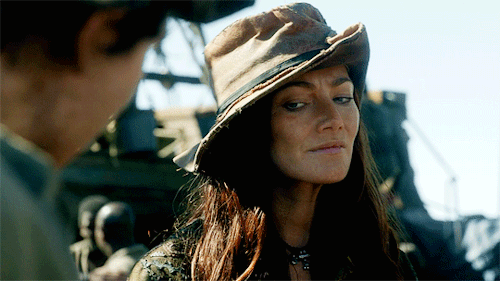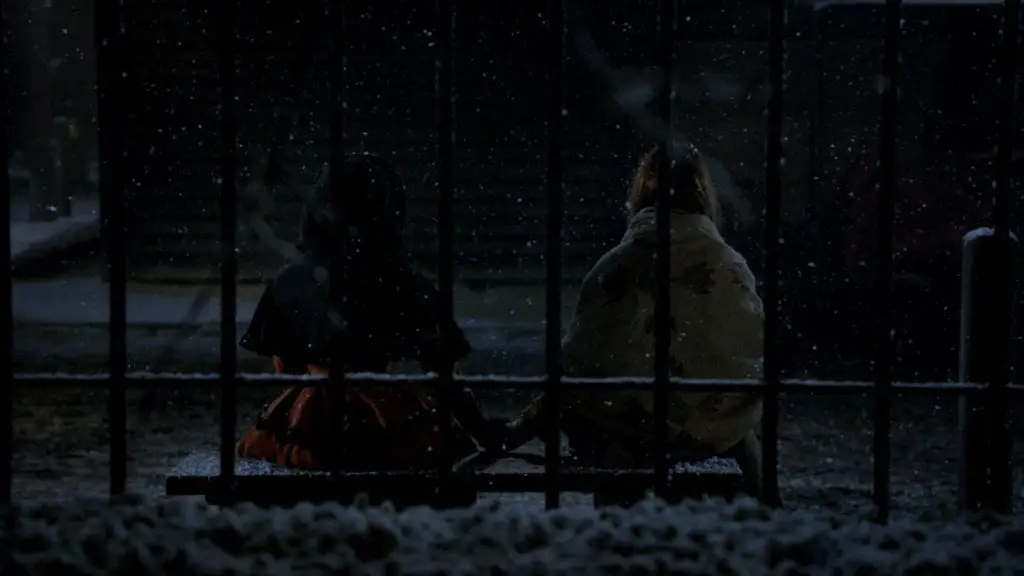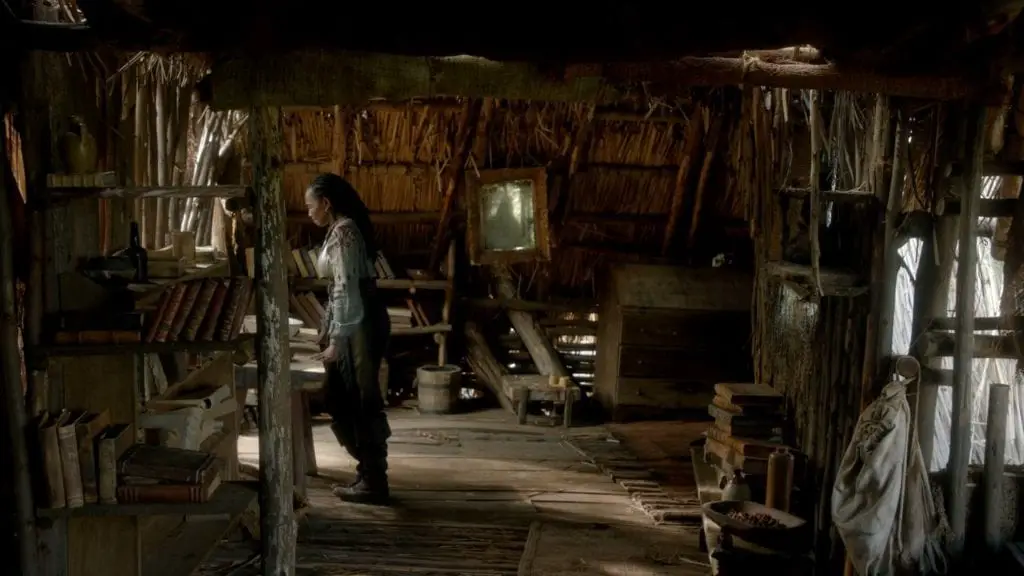Black Sails, the Starz show about swashbuckling pansexual pirates, came to an end on Sunday after four seasons. And not just any end—it came to a conclusion that was so positive and happy, the biggest criticisms levied at it were how it “felt like fanfic.”
The thing is, I kind of see that point, though I’d never consider it a negative.
It’s not exactly breaking news that our current media seems to be in competition to out-Dark and Edgy™ one another, even to the point of self-parody. Emmys are not the be-all and end-all, but for the past two years the show that’s won for “Outstanding Drama” is the one devoid of coherent plotlines, and relies instead on narrative sadism as a way of keeping viewer attention.
The reason I started watching Black Sails was actually because it’s often likened to Game of Thrones. In my case, it was to compare and see how it stacked up, but I’d assume for most, this was considered a selling point. You see, it was another “gritty” show set in a different time period, that offered a “historical realism” (though…there actually was a historical setting in the case of Black Sails). Which is more or less a fancy way of saying there’s sex and blood.
But it really is true: Black Sails never shied away from the reality of the world they established. And yes, like most other “gritty” shows, this included raping one of their major female characters in the first season. It was definitely a misstep; yet at the same time, there also was an honest attempt to explore this issue through the eyes of the women on the show and come away with some kind of meaning. Additionally, this wasn’t the only time the setting magically impacted the characters. There were amputations and truly grisly deaths that were in accordance to what pirates contended with. Even more so, the driving tension of the show was, in many ways, the influence societal conventions had on characters and the way this rigid and often unjust system pushed individuals into the pirate life.
Piracy wasn’t exactly glorified either, and Max and Eleanor’s characters helped to ground us on both sides of the conflict. In a single episode, we could be cheering for John Silver and James Flint to come storming in and fuck everything up, while also nodding our heads in agreement at Max’s point about what a tenable, achievable peace would look like with England. For this reason, there were no simplistic “good guys” and “bad guys”; most of the main characters both embraced and eschewed traditional heroic qualities.

In short, this was a bonafide “adult” show with the elements ripe for a grimdark Edge-fest. After all, “anyone could die” (there were at least a couple of deaths as early as Season 1 that felt surprising), and there was an established willingness to “go there.” I did tend to give Black Sails the benefit of the doubt, and the second and third seasons made me feel as though that trust was not misplaced, even if a decision or two seemed questionable.
No seriously, I still don’t know how I feel about Miranda’s death driving Flint to burn Charlestown down.
Enter Season 4. With the show’s stated desire to hook up with Treasure Island, I already had a strong sense of foreboding with a character who wasn’t Silver, Bones, and Madi. Even in Flint’s case, I saw room for the showrunners to alter the manner (and timing) of his death so that we’d watch it on-screen. As for the historical pirates? Well, sadly Robert Louis Stevenson wasn’t writing about Anne Bonny or Jack Rackham. Death is an elegant solution to solve that problem, no?
However, I wasn’t truly worried until the mid-season, where there were significant signs of trouble. Blackbeard’s keelhauling was one of the most graphic things I’ve ever witnessed on TV. It was horrible to a point, but it felt like it was edging its toe over the line. The week after was possibly even bloodier and featured Anne Bonny nearly dying while getting beat up and cut. Two weeks after that, Eleanor was killed off in…not the most organic manner, because the dude she loved was terrible.
Teach’s death alone was enough to raise my hackles. I had been there before, suffering through shows that make the viewers pay for their engagement. When Eleanor died, I threw up my hands, seeing no positive outlook. How would Jack realistically survive at that point? How would Eleanor’s death amount to anything that justified itself (I’m still as torn here as I was with Miranda)? And, how would Max choosing Anne over Nassau (kinda…I’m simplifying here) not have negative repercussions for her? All I saw was a forgone grimdark conclusion.
Instead, we got our “fanfic.”
Yes, Eleanor was killed off, and there was no undoing that. But for the remaining characters, their endings were happy to the point of idyllic. Max was given Nassau with Idelle and Featherstone filling important roles, Jack and Anne reunited and were able to carry on their swashbuckling ways without fear while we also got Anne and Max’s reconciliation (the OT3 LIVES), Silver and Madi reunited and seemed on a trajectory for things to be alright-ish (though not in a way that stomped all over Madi’s agency), and they unburied a gay so Flint could be happily with him again. A gay was unburied so that the main character could be with him in the end. Who does that?!
By the time ~~Mark Read~~ joined Jack’s crew and Anne was giving him the up and down, I began to wonder if I was dreaming.

The thing is, none of these moments felt unearned. Mark Read was maybe the closest thing we had to dreaded “fan-service”, but all of these conclusions were born out of the characters and their dynamics with one another. Even more, the creators themselves confirmed that this was pretty much the ending they always envisioned.
“We’d had a running sense for a while of what we wanted it to feel like and the kinds of things we wanted to do, both before we got to the ending and within the ending. It was a constant game of keeping our eye on that target but then also trying to let the story evolve to where it wanted to, make sure we weren’t being too rigid about that…It’s largely the ending we were hoping for when we started at the very beginning of the series, so to be able to bring it back to a place that felt complete and right and like we told a whole, full story, that’s rare.” —Jon Steinberg
As to letting the story organically evolve, there was just one major thing Steinberg pointed to as having been altered from their original plan:
“All of the notes we wanted to play lined up as we got to the end. But I think the Max (Jessica Parker Kennedy) and Anne (Clara Paget) relationship was something that became emotionally impactful in a way that we didn’t see coming. That was a lesson in if you’re not letting stories evolve naturally, then you’re missing all the good stuff.”
This…makes a lot of sense. In Season 2, there was room for Max’s pursuit of Anne to be rather cynical in nature, especially how things were quickly framed as mind games between her and Jack. Yet by the mid-season, when Max went over and beyond to protect Anne and seemed to both understand and be willing to work through her trauma from a deeply empathetic place, things took a turn. It would not shock me at all that Max and Anne’s super domestic behavior at the beginning of Season 3 had never been considered before. Yet after listening to these two characters, scenes between them led somewhere incredibly earnest and touching.

At its essence, Black Sails set out to tell the story of Silver and Flint’s relationship—a fraught frenemyship. It was to set up Treasure Island and provide more insight into the way tensions built between them, and imbue the story with a greater sense of tragedy. The other characters weren’t exactly inconsequential, but they existed as swashbuckling support that grew and evolved as the writers, directors, and actors brought them to life. Yes, they probably knew that Jack would end the series sporting Calico Jack’s famous flag, and that Charles Vane would die to jumpstart a pirate resistance. But the focus was always on the central tension of Flint and Silver, while also being cognizant to craft a story where the audience could understand where everyone was coming from.
In other words, Black Sails already *was* fanfic. It was pre-canon, canon-compliant with a quasi historical-AU flair. #Dontlikedontread. Steinberg says as much:
“We tried to have a fair amount of discipline about certain elements of that book and treat them as canon and things we just had to find a way to make sense of. There are some other elements that I think are relayed through unreliable narrators in the book or seemed, to us, to be part of a narrative that was clearly embellished from some history that came before it. Part of the process of trying to land this story into that book was about sorting out the two and figuring out what really is canon. What’s Long John Silver’s story? It’s not necessarily something to be taken at face value. But it was a challenge. That book doesn’t contemplate 40 hours of story that come before it.”
Guys…Black Sails was created by a bunch of fanfic-writing nerds. And this isn’t a bad thing!
Neither is a happy ending. It’s almost as if we’ve become so used to having some level of dissatisfaction or sadness with our media, because of course someone or something gets punished along the way, that we don’t know what to do when we get what we want. Heck, people were even theorizing that Silver was lying to Madi about Flint and Thomas’s reunion, just because it was so impossible to imagine such a positive and affirming for a character…especially a bisexual one.
It’s not even like it was all rainbows and unicorns; I’m still mourning Eleanor and frustrated given how impactful the scenes were between her and Madi or Max this year. There was a lot of potential for her to matter in the end game, and I won’t hear otherwise.

But still, was this fan-service? Yes. Yes, it served us, the fans well. And not only did it do that, but it gave a giant middle finger to every grimdark show that drags its audience along for the masochistic ride. People: we don’t need this! Black Sails just demonstrated that happier endings can have meaning and be both satisfying and complete. There’s not something juvenile about it when the story makes sense and is born of the characters.
There’s a reason so many people on this site are happy to revisit and continue talking about The Legend of Korra. And you know what? Black Sails is not likely something I’m going to be leaving behind either. Let’s just hope it’s not the only certified Adult™ show that takes this course. Because I promise, viewers are more than happy to wade in these waters.

